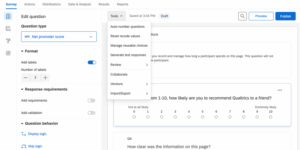Best Smart Survey Platforms
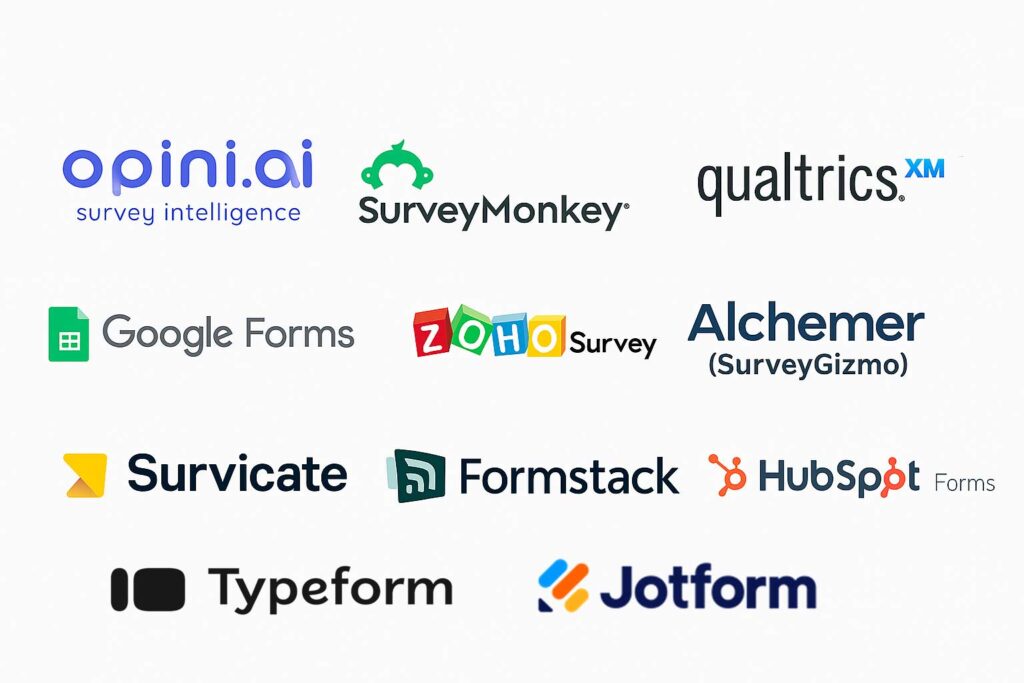
Table of Contents
Introduction
The Rise of Intelligent Survey Tools
Why Businesses Need Smart Survey Platforms
What Makes a Survey Platform ‘Smart’?
AI Integration and Automation
Real-time Analytics and Reporting
User Personalization & Adaptive Questioning
Top Features to Look for in Smart Survey Tools
Integration with CRM & Marketing Tools
Multi-Channel Distribution
Sentiment Analysis & NLP
Customization & Branding Options
Opini.ai: The Leading Smart Survey Platform
Overview and Unique Selling Points
Key Features That Make Opini.ai Stand Out
Use Cases & Real-World Success Stories
SurveyMonkey (Momentive): A Legacy Platform with Smart Capabilities
Strengths and Limitations
Ideal Use Cases
Typeform: Conversational Surveys for Better Engagement
Why Typeform Stands Out in the Crowd
Key Features of Typeform
Qualtrics: Enterprise-Grade Smart Survey Intelligence
Unmatched Capabilities for Big Business
Top Qualtrics Features
Google Forms: The Simplicity King (But Smarter Than You Think)
The Power of Google with Simplicity
Zoho Survey: Smart Surveys with Business Integration
Part of a Larger Business Ecosystem
Alchemer (SurveyGizmo): High Customizability for Smart Feedback
Built for Professionals Who Love Data
Jotform: Drag-and-Drop Simplicity Meets Smart Logic
Smart, Stylish, and Surprisingly Powerful
Survicate: Built for Customer Feedback in Real-Time
Closing the Feedback Loop with Smart Automation
Formstack: Intelligent Workflow Surveys for Businesses
Survey Meets Workflow Automation
HubSpot Forms: When Surveys Meet CRM Intelligence
Turning Feedback into CRM Gold
Conclusion: Choose the Right Smart Survey Platform for Your Goals
FAQs
What is the most intelligent survey platform in 2025?
Which survey platform is best for small businesses?
Can smart surveys increase response rates?
Is there a free smart survey platform?
How do smart surveys handle open-ended responses?
Best Smart Survey Platforms to Boost Feedback & Insights in 2025
1. Introduction
The Rise of Intelligent Survey Tools
Gone are the days when surveys were dull, lengthy, and barely insightful. In 2025, smart survey platforms have transformed how businesses gather, interpret, and act on feedback. Thanks to AI and automation, companies no longer have to manually sift through responses or send generic follow-ups. Instead, platforms use intelligent branching, sentiment analysis, and real-time reporting to make each response matter more.
These platforms are more than just digital forms—they are tools that empower organizations to understand their customers, employees, and target markets on a deeper level. Whether you’re a startup trying to validate a product idea or a multinational optimizing customer experience, smart survey platforms deliver precision, efficiency, and insights.
Why Businesses Need Smart Survey Platforms
Smart survey platforms are no longer a luxury—they’re a necessity. Businesses now operate in fast-paced environments where understanding audience behavior, preferences, and pain points can make or break success. Traditional tools just don’t cut it anymore.
The biggest difference? Actionable data. Smart survey tools interpret data as it’s collected and allow businesses to make real-time decisions. From improving product features based on user feedback to enhancing customer service with timely alerts, these tools unlock new levels of agility.
2. What Makes a Survey Platform ‘Smart’?
AI Integration and Automation
One of the hallmarks of a smart survey tool is the ability to automate everything—from question sequencing to follow-up actions. Artificial intelligence ensures that the survey adapts to the user based on their answers, creating a more personalized and engaging experience. It also identifies trends, detects anomalies, and even predicts future behaviors based on past feedback.
Real-time Analytics and Reporting
Smart platforms allow real-time tracking of responses. Instead of waiting for the entire survey to complete, you can see trends forming as they happen. This is especially useful during events or campaigns where timing is critical. Dashboards provide visual insights, making it easy for teams to digest large amounts of data quickly.
User Personalization & Adaptive Questioning
Not every respondent is the same—so why treat them that way? Smart platforms adapt questions based on user profiles, behavior, or previous answers. This leads to better response rates and higher data quality. It’s like having a dynamic conversation instead of a static form.
3. Top Features to Look for in Smart Survey Tools
Integration with CRM & Marketing Tools
Any survey platform worth its salt should integrate seamlessly with your existing tech stack. That means direct connections to CRMs like Salesforce or HubSpot, marketing automation tools, and customer support systems. These integrations enable real-time action on feedback, such as triggering emails, updating customer profiles, or initiating support tickets.
Multi-Channel Distribution
Whether it’s email, SMS, in-app, or embedded on your website, smart survey tools make it easy to reach your audience where they are. Multi-channel distribution ensures better engagement and provides flexibility in how you collect responses.
Sentiment Analysis & NLP
Natural Language Processing (NLP) allows platforms to analyze open-ended responses, detect sentiment, and tag feedback by topics or emotions. This is essential for large-scale surveys where manually reading thousands of responses isn’t feasible.
Customization & Branding Options
Surveys should look and feel like an extension of your brand. Custom domains, branded templates, themes, and logic-based personalization create a consistent user experience and build trust with respondents.
4. Opini.ai: The Leading Smart Survey Platform
Overview and Unique Selling Points
At the top of our list is Opini.ai, a next-generation smart survey tool built specifically for the modern marketer and business leader. What sets Opini.ai apart is its AI-first architecture and focus on making every survey interaction smarter, faster, and more meaningful.
Opini.ai isn’t just a form builder—it’s an intelligent conversation engine. From predicting the best time to send surveys to crafting the most engaging questions, everything is data-driven.
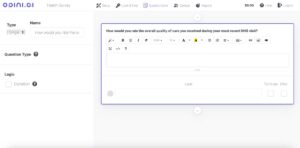
Key Features That Make Opini.ai Stand Out
AI-powered adaptive questioning
Real-time analytics and dashboards
Deep sentiment analysis
- Sentiment Analysis: Understand customer emotions and feedback at scale.
- Real-Time Data Processing: Insights are delivered as events unfold.
- Predictive Analytics: See future trends before your competitors do.
- Survey Automation: Create, distribute, and analyse surveys with AI support.
- Multichannel Data Collection: Pull insights from emails, social media, websites, and more.
- Dynamic Reporting Dashboards: Visual, interactive reports that update in real-time.
It also offers an intuitive drag-and-drop builder, mobile optimization, and one-click survey duplication—saving time without compromising on power.
Use Cases & Real-World Success Stories
Whether it’s a tech startup using Opini.ai to validate MVP feedback, or a retail brand monitoring customer satisfaction at scale, the platform has proven its versatility. Companies report up to a 40% increase in response rates and 60% faster turnaround from feedback to implementation.
5. SurveyMonkey (Momentive): A Legacy Platform with Smart Capabilities
Strengths and Limitations
SurveyMonkey has been around for years, but it has evolved to incorporate smart features like advanced logic, sentiment analysis, and automated reporting. It’s great for businesses that need reliable functionality and a familiar interface.
However, it’s not as AI-driven as newer platforms and may fall short on customization and integrations for advanced users.
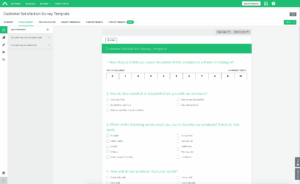
Ideal Use Cases
Customer satisfaction (CSAT) surveys
Net Promoter Score (NPS) collection
Employee engagement assessments
Quick pulse checks during product launches
6. Typeform: Conversational Surveys for Better Engagement
Why Typeform Stands Out in the Crowd
Typeform turns traditional surveys into interactive conversations. By showing one question at a time, it mimics a natural flow that keeps respondents engaged. This unique UX design alone increases response rates significantly.
But it’s not just pretty—Typeform uses conditional logic to personalize the survey journey based on each user’s answers. It also integrates with hundreds of tools and offers excellent data analytics features.
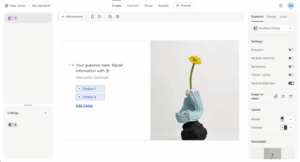
Key Features of Typeform
One-question-at-a-time interface
Smart logic and branching
Sleek, mobile-friendly design
Integration with Zapier, Google Sheets, Mailchimp
Real-time response tracking
7. Qualtrics: Enterprise-Grade Smart Survey Intelligence
Unmatched Capabilities for Big Business
Qualtrics is a powerhouse. With features like advanced analytics, sentiment detection, and predictive modeling, it’s built for enterprises that need more than just basic feedback.
It allows companies to manage entire experience ecosystems—customer, employee, brand, and product—from one place. Qualtrics is ideal for decision-makers who need data they can trust to guide million-dollar strategies.
Key Features
iQ Suite for predictive intelligence
Text analysis and topic tagging
Custom dashboards and reports
Alert systems for real-time follow-up
Seamless integration with enterprise tools
8. Google Forms: The Simplicity King (But Smarter Than You Think)
The Power of Google with Simplicity
Google Forms might seem basic, but when used creatively, it can do a lot. It’s free, fast, and integrates beautifully with Google Sheets. While it lacks built-in AI features, you can achieve smart functionality through add-ons and scripting.
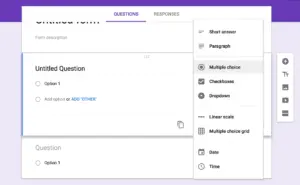
Perfect for schools, small businesses, or quick feedback loops.
9. Zoho Survey: Smart Surveys with Business Integration
Part of a Larger Business Ecosystem
Zoho Survey becomes especially powerful when paired with Zoho CRM, Zoho Campaigns, and Zoho Analytics. It offers advanced logic, multilingual support, and survey scoring features. AI features like sentiment detection give deeper insight into feedback trends.
A great choice for existing Zoho users or small businesses wanting CRM integration.
10. Alchemer (SurveyGizmo): High Customizability for Smart Feedback
Built for Professionals Who Love Data
Alchemer offers advanced features like scripting, complex branching, white-labeling, and strong API access. It’s incredibly flexible and perfect for businesses that need custom data collection flows.
Its biggest strength? Deep customization and enterprise-grade integrations.
11. Jotform: Drag-and-Drop Simplicity Meets Smart Logic
Smart, Stylish, and Surprisingly Powerful
Jotform blends ease of use with powerful logic features. You can create beautifully designed surveys that behave intelligently based on respondent actions. It’s perfect for educators, freelancers, and small teams.
12. Survicate: Built for Customer Feedback in Real-Time
Closing the Feedback Loop with Smart Automation
Survicate shines when it comes to customer journey feedback. With real-time response triggers and CRM integrations, it’s perfect for SaaS and product teams who want to collect, interpret, and act on feedback in one ecosystem.
13. Formstack: Intelligent Workflow Surveys for Businesses
Survey Meets Workflow Automation
Formstack is ideal for businesses that need surveys to do more—like trigger document creation or start approval processes. It’s a great tool for HR, healthcare, and finance teams.
14. HubSpot Forms: When Surveys Meet CRM Intelligence
Turning Feedback into CRM Gold
HubSpot Forms connect surveys directly with CRM, allowing automated follow-ups and lead nurturing. While limited as a standalone tool, it’s incredibly powerful within the HubSpot ecosystem.
15. Conclusion: Choose the Right Smart Survey Platform for Your Goals
Choosing the right survey platform is like picking a new team member—it needs to align with your goals, work well with your tools, and grow with your business.
If you want bleeding-edge intelligence, Opini.ai leads the pack. For enterprise muscle, look at Qualtrics. Want great UX? Try Typeform. Need something free and fast? Google Forms won’t disappoint.
In short: Let your needs lead the way. The smartest tool is the one that helps you ask better questions—and take smarter action.
FAQs
1. What is the most intelligent survey platform in 2025?
Opini.ai is the most advanced, offering AI-powered personalization, predictive analysis, and seamless integrations.
2. Which survey platform is best for small businesses?
Jotform, Google Forms, and Zoho Survey offer powerful features at low (or no) cost.
3. Can smart surveys increase response rates?
Yes. Personalized, logic-based surveys create better user experiences, leading to higher completion rates.
4. Is there a free smart survey platform?
Yes, Google Forms is free and smart when used with add-ons. Jotform also has a generous free plan.
5. How do smart surveys handle open-ended responses?
They use Natural Language Processing (NLP) to analyze text, extract themes, detect sentiment, and suggest next steps.
START CREATING TODAY
Start testing, Stop guessing and start knowing. Whether you’re collecting customer feedback, testing a new idea, or just curious what people think—Opini.ai makes it easy, fast and creative.
✅ Unlimited responses
✅ AI-powered logic
✅ No coding, no credit card
✅ Start in under 60 seconds
